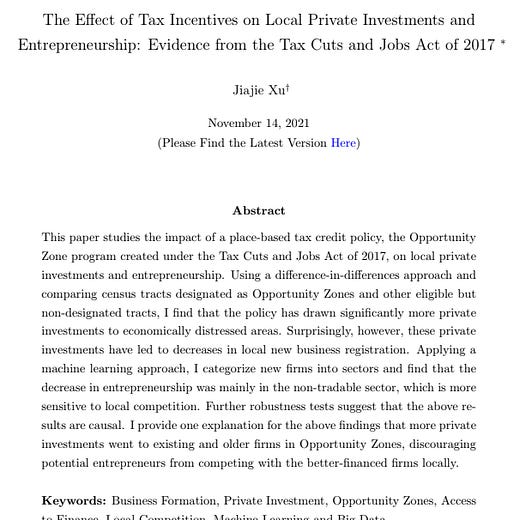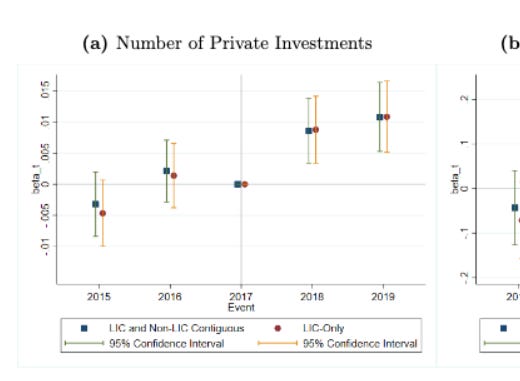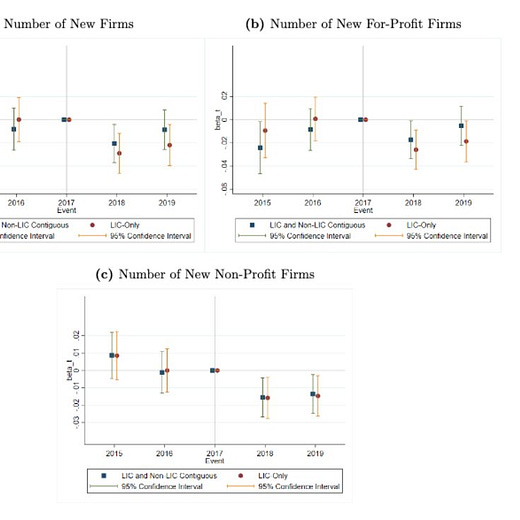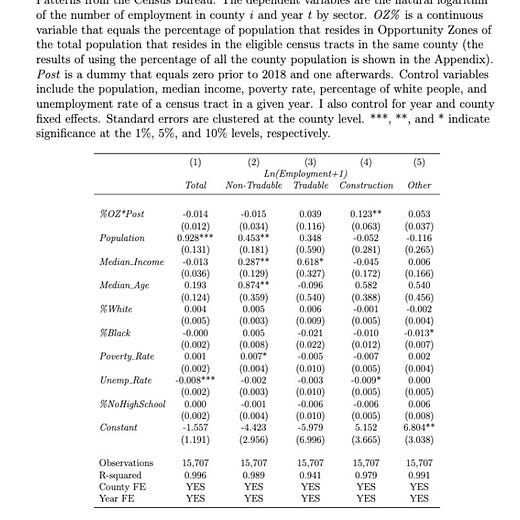Best of #econtwitter - Week of November 28, 2021
Nov 29, 2021
Welcome readers old and new to this week’s edition of Best of Econtwitter. Thanks to those sharing suggestions, over email or on Twitter @just_economics.
Paper summary threads

Amory Gethin@amorygethin
Hugely excited to announce the publication of our article in @QJEHarvard!🤩 This paper is the outcome of a massive data collection effort that we started with @cmtneztt and @PikettyLeMonde in 2017.
A few takeaways on the evolution of political divides in Western democracies 👇

4:41 PM · Nov 25, 2021
216 Reposts · 889 Likes

Andrew Van Dam@andrewvandam
the half-life of innovation: remarkable chart by @ProfSongMa shows how quickly tech becomes obsolete
https://t.co/csSb7g8cD5
full paper: nber.org/papers/w29504

4:06 PM · Nov 22, 2021
5 Reposts · 16 Likes

Mauricio Romero@marome1
🚨🚨🚨New WP🚨🚨🚨
"The incidence of affirmative action: Evidence from quotas in private schools in India" -- by @singhabhi and me.
Full working paper: mauricio-romero.com/pdfs/papers/CG…
🧵:

11:03 PM · Nov 24, 2021
47 Reposts · 216 Likes

Fabian Schär@chainomics
Why do people buy virtual land? Read our new working paper on the price determinants of land parcels in the #metaverse. This is joint work with @golmit_crypto and Peter Kugler!
Link to the working paper: papers.ssrn.com/sol3/papers.cf…
1/4

3:56 PM · Nov 24, 2021
41 Reposts · 102 Likes

Giovanni Ricco@ricco_giovanni
Our paper on "Identification with External Instruments in Structural VARs" (w/ @_SiLviA_mA ) has been accepted at JME
The editor, Yuriy Gorodnichenko, and the referees helped immensely in improving the paper and we could not be more grateful
tinyurl.com
Identification with External Instruments in Structural VARs

3:27 PM · Nov 23, 2021
29 Reposts · 230 Likes
More: factor pricing debate; inflation narratives
Job market papers

Joonas Tuhkuri@joonastuhkuri
Excited to share my JMP, “New Evidence on the Effect of Technology on Employment and Skill Demand.”
*Main result*: Technologies led to increases in employment and no change in skill composition.
economics.mit.edu/files/22239
#EconTwitter #EconJobMarket 🧵

3:46 PM · Nov 26, 2021
33 Reposts · 222 Likes

Jesse Bruhn@jmb112485
🚨🚨 NEW PAPER ALERT 🚨🚨
My incredible coauthor @PankaBencsik recently posted her job market paper! If you are interested in the trade-offs between harsh criminal sanctions and addiction treatment in the context of the opioid crisis, then join me in this thread:
1/n

5:17 PM · Nov 28, 2021
30 Reposts · 110 Likes

Arpit Gupta@arpitrage
Interesting JMP by Jiajie Xu finds that Opportunity Zones did attract new private investment; but crowded out local non-tradable entrepreneurs.
jiajiexu.com




8:51 PM · Nov 27, 2021
6 Reposts · 37 Likes

Nacho Cigliutti@nachocigliutti
Hi #EconTwitter. One of my best friends, @seba_hill is on the Job Market this year. He's not very active here, so I want to promote his work.
Here's a striking picture of his JMP, "The Fed and the Secular Decline in Interest Rates"

6:14 PM · Nov 28, 2021
37 Reposts · 185 Likes
Public goods

Jamie Catherwood@InvestorAmnesia
🚨 Historical Data Library 🚨
Thrilled to share the newest Investor Amnesia resource... a free data library with 100+ datasets going back to the 1700s.
Data on stock returns, dividends, bond yields, corp. financials, economic indicators, and MUCH more!
investoramnesia.com/historical-dat…

2:17 PM · Nov 26, 2021
25 Reposts · 113 Likes
Interesting discussions

Alicia Plemmons@Alicia_Plemmons
Many grad students told me they're waiting till Thanksgiving or after to get in the Dec 1st deadlines. Don't. Get in your apps now. I must have talked to people from two dozen schools at SEA whose departments entirely jumped the market and are already doing interviews/flyouts.
12:06 AM · Nov 23, 2021
17 Reposts · 82 Likes
^provoked some discussion on market structure:

John Horton@johnjhorton
@florianederer tbh, I feel kind of ambivalent about this. It's not obvious to me that a centralized / coordinated system benefits every one. I suspect a system organized by the demand side largely benefits the demand side
12:22 PM · Nov 23, 2021
1 Repost · 14 Likes

Shengwu Li@ShengwuLi
In my postdoc, I talked to people in many other fields, including humanities and hard sciences. I have yet to meet someone who thinks that their academic market “works well”.
When I describe the centralized econ market, the reaction is typically disbelief and envy.

John Horton @johnjhorton
@fabolange @florianederer Not being flip, but that sounds fine to me. The "are you going on the market this year / next year" choice certainly has big cost to people when our working lives are measured in decades. An always-running market doesn't sound bad to me & works well in lots of other fields.
3:22 PM · Nov 23, 2021
4 Reposts · 114 Likes
^see also here, here, here, here, also

Thomas J. Leeper@thosjleeper
What's something you wished you'd known as a social science PhD working in industry?
I've seen a lot of questions recently about what faculty can do to coach their #PhD students on #nonac/#altac careers. Can we start a thread of things you wish you'd known?
8:12 PM · Nov 24, 2021
43 Reposts · 157 Likes

Peter Ganong@p_ganong
What advice would you give to someone in the first or second year of their PhD? Asking on behalf of 11 friends.
6:18 PM · Nov 28, 2021
17 Reposts · 258 Likes

Heath Henderson@hendersonhl22
@itaisher Econ needs a second "credibility revolution" where we actually start taking normative questions seriously when making policy recommendations.
6:46 PM · Nov 23, 2021
12 Reposts · 68 Likes

Kevin Bryan@Afinetheorem
@TradeDiversion "the" casual effect of X on Y is even worse. On what internal margin? With what external validity? Of what parameter, of the many that could potentially analogize to X/Y? The idea that modern empirical methods find "the casual effect" has been dreadful for the field
1:58 PM · Nov 28, 2021
2 Likes

Peter Hull@instrumenthull
This may have seemed like a joke, but seriously: it's absolutely wild that, under rather weak conditions, *all* appropriately scaled sample means
(a) converge(!)
(b) to the *same* type of distribution(!!)
(c) which happens to be *especially* nice(!!!)
How did we get so lucky?

Peter Hull @instrumenthull
Thankful for the Central Limit Theorem
11:38 PM · Nov 26, 2021
69 Reposts · 714 Likes
^provoked a surprising amount of discussion?

